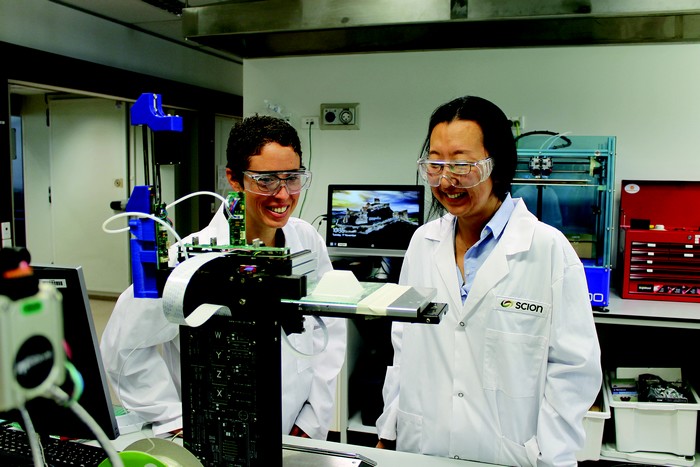Using plant-based resources in new, smart materials
3 January 2022
Scientific exchange between France and New Zealand has a long history, and Scion is no stranger to such collaborations and interactions.
The seeds of collaboration can grow in unexpected ways as a project with INRAe (the French National Research Institute for Agriculture, Food and Environment) shows.
Dr Claire Mayer-Laigle, an INRAe researcher from the Joint Research Unit in Montpellier, visited Scion in 2018 for a one-week exchange with her counterpart Dr Marie Joo Le Guen. Marie Joo was subsequently invited to present at Claire’s laboratory. These successful interactions led to a joint conference presentation and joint research publication.
In 2020, Claire was awarded a prestigious Marie Skłodowska-Curie fellowship in partnership with Scion. The fellowship supports Claire to work at Scion on a three-year research programme exploring the use of plant material in 4D printing.
Claire explained that plant biomass, as a reservoir of functional compounds, could be used to replace oil-based materials and offer a promising avenue for reducing the environmental impact of plastic.
“The functional elements are buried within plant tissues but milling or grinding plant material to ultrafine powders could bring hidden qualities to the surface and allow plant material to be used in advanced 3D printing technologies. We specifically want to understand if we can use plant powder to bring new qualities that we can use to design smart materials for 4D printing - where printed material changes in reaction to environmental stimuli,” said Claire.
This research combines INRAe’s experience in milling plant biomass and Scion’s knowledge of additive manufacturing.
“In Europe, Scion is renowned for its world class capability in biopolymer and biomass extrusion, characterisation and 3D/4D printing using biobased materials. Scion has the capabilities and expertise to characterise powder from biomass and bioproducts (solid-state NMR, confocal microscopy) which supplements the tools available in France. Together we can devise methodologies to develop advanced biobased materials,” said Claire.
Over recent years, Scion has created a network on the ‘additive manufacturing of biomaterials’ comprising researchers passionate about developing the technology and fully committed to environmental issues. Though this programme, Scion aims to enlarge the network to other European institutes and strengthen collaboration.
The programme, which ends in 2024, has already resulted in an international conference presentation and the filing of a patent.
This research collaboration also strengthens the wider MOU agreement between INRAe and Science New Zealand, signed in June 2020.
Read more: https://tinyurl.com/2p973sb2

